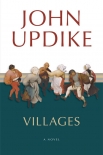Villages by John Updike (best summer reads of all time .TXT) 📗

- Author: John Updike
Book online «Villages by John Updike (best summer reads of all time .TXT) 📗». Author John Updike
Owen’s little room was next to his parents’, and their exchanges unignorably seeped into his ears—the brisk thrusts and counterthrusts of a quarrel, the sighs and groans of weariness in the evening, the playful chatter that began the day. He was happy to have her love him more than she did his father, but he wanted things to be friendly and cozy between the two grown-ups, so that after one of his nightmares they could comfort him by letting him into the warm space between them in their bed.
As he grew, he discovered more places in Willow where sin cast its shadow, which did not slide away like most shadows but had a sticky, pungent quality. On top of the equipment shed at the playground there was a triangular space, under the pavilion roof, that you could boost yourself into only by jumping and grabbing a crossbeam and swinging your feet up, dangerously hanging in midair for a second, and then leveraging your body onto the top of the shed. As Owen’s eyes adjusted, he saw there were more drawings, never painted over, and written messages and allegations involving girls and boys too old for him to have known. Ginger Bitting sometimes scrambled up here after playground hours, and it was pleasant to stretch out imagining her beside him—her wiry, energetic, fearless body—and to look down the perspective of beaded boards to the macadam pavilion floor, where a stray lost jack or red checker could be seen like a secret beside a leg of one of the heavy trestle tables.
In the seventh grade, Owen left the elementary school and went to the high-school building half a mile down the Pike toward Alton. Though girls and boys could enter any of the doors and use the grounds without the sexual division enforced on the elementary-school playground, a whiff of scandal clung to the lower windows on the side of the high school toward Alton, under the corner classroom. They were the windows of the girls’ locker room, reinforced with chicken wire and painted black on the inside. Yet cracks in the aging paint appeared, and small holes were mysteriously scratched in it, from the inside. Though there was no written prohibition, teachers shooed boys away from these windows, and the space here, with its mowed grass and narrow sidewalk, gathered such a thick patina of rumored glimpse and determined spying that Owen emerged into adult life with a memory, as luminous as an Ingres seraglio, of naked girls seen at an angle, past foregrounded asbestos-coated pipes and the dusty green tops of metal lockers—girls with shining shoulders and shower-wet flanks, Barbara Emerich and Alice Stottlemeyer and Babs Dolinski and Grace Bickta but somehow not Ginger Bitting, girls he had grown up with, moving slowly in their budding nudity, oblivious, as if underwater.
Though his mother, a great believer in Nature, often walked around naked on her way to and from the bathroom, and when he was a toddler shared the bathtub with him, Owen had curiously little idea of what a woman’s body looked like, as if, she being his mother, a thick veil intervened. It was only females of his own generation he could see, and who could guide him. Once, wrestling on the baked late-summer playground grass, after Miss Mull had gone home, with Doris Shanahan, a square-faced tomboy from the B-section of the eighth grade who whistled riding her bike and liked to hang around shooting baskets with boys, Owen looked up her shorts as she stood triumphant over him, straddling his face, and he saw, thanks to her underpants hanging loose, a few curly black hairs: it was as if he had never seen pubic hair before. He himself still had none. His seeing Doris’s was a sin, he knew, but it made him happy, and was real. It was knowledge, and knowledge, all the elders of Willow agreed, was good to have.
iii. The Husband
When Owen awakes and discovers that Julia is out of bed, he goes forth in search of her, the two of them enacting semi-comic routines in which they consciously—as if this will placate its advance—flirt with senility.
“Where are you, sweetness?” he calls.
“Here, darling,” she answers, from some far-off room; but the deteriorating quality of his hearing is such that he cannot tell if she is upstairs or downstairs.
“Where’s here?” he shouts, growing irritated.
Her hearing too is not what it had once been, nor her need to respond to him. She falls silent, like a car radio in a tunnel. What a child she still is, he thinks to himself, to believe that “here” explained everything, as if she is the center of the universe. How amazingly selfish!
Still, without being selfish she could not have given him what he so much desired at the time they met: a new center for his life. Spotting self-love in the other had been their point de départ. His first wife had been relatively selfless, as if her self were something she had absent-mindedly left in another room, like a pair of reading glasses.
Julia may have wandered outdoors, in her flip-flops. She loves the outdoors, site of weather and





Comments (0)